Since the 2023 bed bug pandemic in France, the pests have become a household name. Rentokil reported a 65% year-on-year increase in bed bug activity in the UK in 2023, compared to the previous year. The French president was ridiculed when she called for an emergency national plan to tackle the problem in 2019. The issue is still prevalent today, and with increased travel during the summer months, there is little chance of them going anywhere soon.
There are several reasons why bed bugs are on the rise, particularly in busy cities. The pests can attach themselves to anything from mattresses, clothes, to luggage. The good news is that there are measures you can take to protect yourself from carrying them into your home and bedroom. There are also ways to help prevent bed bugs from interfering with your sleep, such as bamboo mattresses and mattress protectors that can prevent moist environments and washing your bedding regularly. Before we look at those, let's explore what bed bugs are and why they are a health hazard that needs to be addressed urgently.
What are bed bugs?
This bit might not be comfortable to read; bed bugs are essentially small, itchy insects that can hide in environments such as bedding, mattresses, clothes and luggage. They are reddish brown in colour and oval-shaped. Adult bed bugs are around 5-7 mm long, while bed bug eggs are tiny and white, often going unnoticed. They do not fly, though they can move very quickly. It can be quite disturbing to find one whether at home or on your clothes, often causing emotional distress, sleep disturbances and anxiety. Our homes are a sanctuary and naturally should be a place where we can relax and feel at ease, which makes the idea of bed bugs even more distressing.
What causes bed bugs?
Bed bugs are pretty tiny, so it’s easy for them to sneak into your home in various ways. They can attach themselves to furniture, clothes and luggage and like moist environments. They particularly like bedding and mattresses, which can retain moisture from sweating at night. If you have been exposed to them during the day, you can carry them back home. With the increase in travel from the Eurostar, trains and flights, they pose a particular problem to busy cities like Paris and London. Our sleep expert Max Kirsten says “Travel and hotel rooms are the main cause of transmitting bed bugs”.
While Eurostar is keen to reassure travellers their surfaces are clean and safe and Kate Nicholls, the UK hospitality CEO says “there is no indication of this happening in the UK”, there are naturally still concerns. So what can you do to prevent bed bugs in your home?
How to check for bed bugs?
To check for bed bugs, start by examining your bed area thoroughly. Look for small, reddish-brown insects, typically about the size of an apple seed. Check the seams of your mattress, bed frame, and box spring. Also, inspect nearby furniture, including nightstands and dressers. Look for tiny blood spots on your sheets or mattress, indicating bedbug presence. Using a flashlight can help in spotting these elusive pests. Remember to check in crevices and hidden spots, as bed bugs tend to hide in small spaces. If you find any signs of bed bugs, it’s advisable to contact a professional pest control service for proper identification and treatment.
What are the early signs?
Early signs of bed bugs include small, itchy bite marks on your skin, often in a line or cluster, which you might notice upon waking. Another indicator is tiny blood stains on your sheets or pillowcases, resembling small rust spots. You may also spot small, dark excrement spots or bedbug eggs (tiny, yellowish-white, and oval) in the seams of your mattress or upholstery. An unmistakable sign is the presence of live bed bugs, small, brownish insects about the size of an apple seed. Additionally, a subtle, sweet, musty odour can sometimes be detected in areas with a heavy bed bug infestation. If you observe any of these signs, a closer inspection or professional consultation may be necessary.

Bamboo to the rescue
Bed bugs are notoriously challenging due to their small size, rapid reproduction rate, and ability to hide in tiny crevices. They can survive for months without feeding, making persistent pests in homes. Moreover, a recent study suggests that bed bugs increasingly resist common pesticides, complicating extermination efforts. In this scenario, using bamboo sleep products can be beneficial.
Why is bamboo a natural defence against bed bugs?
We all have our comfort zones; bed bugs love moist environments, so bedtime is a favourite. Due to how much moisture we lose at night, up to 25 ml per hour, our mattresses and bedding can be the ideal breeding spot for bed bugs. Bamboo is moisture-wicking, antibacterial and highly breathable, making it nature’s natural defence to bed bugs. The wonder fabric is also thermoregulating, preventing overheating and reducing sweating for a healthier, fresher and more comfortable sleep. “As mattresses are a major carrier of bed bugs, choosing a bamboo mattress can help,” our sleep expert says.
Can you get bed bugs in a memory foam mattress?
The short answer is yes, it’s possible to have a bed bug infestation in a memory foam mattress. However, the good news is that the nature of memory foam means they cannot get much further than the surface. As the saying goes, don’t let the bed bugs bite! In the next few paragraphs, we’ll advise on ways to protect your mattress so you don’t lose any sleep over these nighttime intruders.
How bed bugs interact with memory foam
Memory foam is too dense for bed bugs to be able to burrow. Instead, they can hide underneath the mattress, in the seams, crevices or zips. Headboards and bed frames are other places where they like to live undetected. If there’s a hole in your memory foam mattress and you suspect bed bugs, you should check inside. They’re drawn to dark, warm spaces and carbon dioxide, making their target humans rather than the mattress foam. Any place which gives them easier access to you is their favourite spot.
Advantages and limitations of memory foam
In memory foam, bed bugs cannot roam. Compared to traditional spring or fabric-covered mattresses, memory foam is compact and non-porous with a smooth coating, making it much more difficult for insects to penetrate. Despite this, one key quality of memory foam is heat retention, creating a warm and humid environment, which is inviting to a bed bug. However, it’s possible to minimise the risk of attracting them. In addition to maintaining a hygienic sleep space, washing your bedding regularly and hoovering around the bed can help deter them and also adding a bedding encasement to your mattress. Offering protection against critters and dirt, it seals your mattress completely without exposing it. Combining it with regular inspections of your bed frame will keep your mattress from unwelcome visitors.
Comparison to bamboo mattresses
Bamboo is naturally inhospitable to dirt, bacteria and microorganisms. Breathable and sweat-wicking, it counteracts memory foam's heat and deters bugs as it keeps the mattress cool and dry. Outperforming memory foam mattresses without bamboo, these qualities make it one of the best options. Our Panda Hybrid Bamboo Mattress Pro utilises the fresh innovation of bamboo-infused open-cell memory foam. A zip-off bamboo cover provides an antimicrobial barrier between you and any unwanted inhabitants. Antibacterial and anti-odour, it’s the antidote to a clean sleep between washes. Whilst no mattress is immune, if you’re concerned about the threat of bed bugs, a bamboo mattress will put your mind at rest, providing an added shield of protection to your bed.
What type of mattress do bed bugs not like?
The type of mattress that a bed bug wouldn’t like is a mattress that no human is sleeping on! Their dream scenario is a warm platform that gives them 24/7 access to you. This means no mattress is 100% bed bug-proof, but there are mattresses which are better equipped at preventing an outbreak. Read on to find out which mattresses provide a hostile environment to bugs, but not you.
Bamboo mattresses
All the varying mattress options can make searching for your ideal one tiring. When it comes to a mattress purchase, you’ll likely consider support and comfort a priority over the fabric, but when it comes to bed bug prevention, it's key. Moisture-wicking and breathable, bamboo optimises airflow and regulates your temperature as you sleep, all the while keeping your mattress dry. Naturally antibacterial, it stops dirt, bacteria or bugs from infiltrating it. Our Hybrid Bamboo Mattress is a good example of providing a cool and dry environment - the opposite of where a bed bug thrives. They enjoy moist and damp beds, and as bamboo is sweat-wicking, it makes it less inviting. Wrapped up in a smooth zip-off bamboo cover, there are fewer creases for the bugs to be concealed in compared to quilted mattresses.
Memory foam mattresses
As mentioned previously, memory foam is dense and tightly packed, which is an advantage when it comes to infestation prevention. In contrast, traditional innerspring mattresses often have deep stitching, buttons, and layers where bed bugs love to settle. Due to the heat retention of memory foam mattresses, you’re best to opt for a bamboo memory foam mattress, as the breathability and moisture-wicking components of the bamboo counteract the heat to keep it dry, cool, and comfortable. It is also advisable to cover it with an encasement so bed bugs cannot get in.
Latex mattresses
Similarly to bamboo, latex is a breathable and antimicrobial material, so it keeps the mattress clean and dry and, therefore, uninviting to creepy crawlies. Its density and non-porous qualities also make it a good choice of mattress material when eliminating the possibility of infestations. As latex mattresses don’t have box springs they can easily crawl into, they're more compatible with an encasement. Even though they’re a durable option, the downside to latex mattresses is that they’re more expensive than memory foam.
Hybrid mattresses
Hybrid mattresses are another option which provide a less welcoming environment to pests. Compared to traditional innersprings, a combination of springs and compact memory foam gives less opportunity for hiding places. We recommend choosing a bamboo hybrid mattress for extra peace of mind, adding an antibacterial and breathable layer of protection.
The least favourable mattresses and why
As you may have guessed, the mattress which is least resistant to infestation is an open coil mattress. Providing the ideal environment, these traditional mattresses make it easier for them to thrive in its dark nooks and crannies.

Prevention reminder
As the saying goes, prevention is better than cure, and this is certainly true when it comes to the issue of bed bugs. Maintaining hygiene, regular inspections of the area and investing in an encasement are all good ways to keep them at bay. Opting for a bamboo hybrid mattress gives you the best possible defence.
| Choose between our award-winning Hybrid Bamboo Mattress and Hybrid Bamboo Mattress Pro. |
FAQs
1. How does bamboo help in repelling bed bugs?
Bamboo has natural properties that bed bugs find unappealing. Its fibres are densely woven, making it difficult for bed bugs to navigate. Bamboo is also moisture-wicking, keeping the environment dry and discouraging these pests.
2. Are bamboo beddings bed bug-proof?
While bamboo provides a natural barrier, it's essential to maintain good hygiene and follow prevention methods to deter bed bugs. Using bamboo bedding can be a valuable part of your defence.
3. Is bamboo bedding a safe choice for those with allergies?
Bamboo is hypoallergenic and resists common allergens like dust mites and moulds, making it an excellent choice for allergy sufferers.
4. How often should I wash bamboo beddings to prevent bed bugs?
Regular washing is advisable. Beddings should be washed at least every 1-2 weeks to maintain freshness and reduce the risk of bed bugs and allergens.
5. Are there any specific bamboo products recommended for bed bug prevention?
Bamboo sheets, mattress covers, and pillowcases can all be helpful in bed bug prevention. These products are readily available, and offer added comfort.
6. Can bamboo products be combined with other bed bug prevention methods?
Absolutely. Bamboo products can complement other prevention techniques, such as regular cleaning, reducing clutter, and inspecting for signs of bed bugs.

![[MattressTopper] Panda London Memory Foam Bamboo Mattress Topper package box](http://pandalondon.com/cdn/shop/files/Bamboo_Mattress_Topper_Package_Box.webp?v=1742301823&width=1500)
![[MattressTopper] Panda London Memory Foam Bamboo Mattress Topper on the floor](http://pandalondon.com/cdn/shop/products/Panda-Memory-Foam-Bamboo-Mattress-Topper-Yoga-e1624045454555.jpg?v=1742301823&width=1000)
![[MattressTopper] Bamboo Mattress Topper Lifestyle Image with Memory Foam Pillows Product Page](http://pandalondon.com/cdn/shop/files/Bamboo_Mattress_Topper_Lifestyle_Image_with_Memory_Foam_Pillows_Product_Page.webp?v=1742301823&width=800)
![[MattressTopper] Bamboo Mattress Topper Lifestyle Image with Bamboo Pillows In the Garden room Product Page](http://pandalondon.com/cdn/shop/files/Bamboo_Mattress_Topper_Lifestyle_Image_with_Bamboo_Pillows_In_the_Garden_room_Product_Page.webp?v=1752572859&width=800)
![[MattressTopper] Panda London Memory Foam Bamboo Mattress Topper side](http://pandalondon.com/cdn/shop/files/Mattress_Topper_Isolated_-_resized.jpg?v=1752572859&width=800)
![[HybridMattressPro] Main Image for Hybrid Bamboo Mattress Pro with all awards](http://pandalondon.com/cdn/shop/files/Hybrid_Bamboo_Mattress_Pro_Main_product_Image_with_awards.webp?v=1753971649&width=1000)
![[HybridMattressPro] Breathable Hybrid Bamboo Mattress](http://pandalondon.com/cdn/shop/products/Breathable-Hybrid-Bamboo-Mattress.jpg?v=1753971649&width=1920)
![[HybridMattressPro] Hybrid Bamboo Mattress Pro Cover Zip](http://pandalondon.com/cdn/shop/files/Hybrid_Bamboo_Mattress_Cover.jpg?v=1753971649&width=800)
![[HybridMattressPro] Panda Hybrid Bamboo Mattress Pro](http://pandalondon.com/cdn/shop/files/Hybrid_Bambo_Memory_Foam_Mattress_-_BioCell_Foam_x.jpg?v=1755095108&width=800)
![[HybridMattressPro] Couple on a Hybrid Bamboo Mattress Pro](http://pandalondon.com/cdn/shop/files/Hybrid_Bamboo_Mattress_Couple.jpg?v=1753971649&width=800)
![[CloudDuvet] Panda London The Cloud Bamboo Duvet Packaging](http://pandalondon.com/cdn/shop/products/Panda-London-The-Cloud-Bamboo-Duvet-Panda-Life-scaled_00a651ad-4ca3-4105-b520-12a94c1a4f71.jpg?v=1713363286&width=1920)
![[CloudDuvet] Panda London The Cloud Bamboo Duvet Rolled](http://pandalondon.com/cdn/shop/products/Duvet-Listing-Images03.jpg?v=1713361452&width=1000)
![[CloudDuvet] Panda London The Cloud Bamboo Duvet Girl Huggin a Duvet on the Bed](http://pandalondon.com/cdn/shop/files/Cloud_Bamboo_Duvet_-_Lady_Hugging_it_on_Bed_LifestyleImage.jpg?v=1719327585&width=1000)
![[CloudDuvet] Panda London The Cloud Bamboo Duvet Guy In the Air with Cloud Bamboo Duvet](http://pandalondon.com/cdn/shop/files/GuyonaHybridBambooMattresswithCloudDuvet.jpg?v=1743097928&width=2000)
![[CloudDuvet] Panda Cloud Duvet Winter on the bed lifestyle image](http://pandalondon.com/cdn/shop/files/Panda_Cloud_Duvet_Winter_on_the_Bed_Lifestyle-1_image.jpg?v=1747994959&width=1000)
![[BBWhite] White 100% Bamboo Bedding](http://pandalondon.com/cdn/shop/files/Pure_White_Full_Bed.webp?v=1719581797&width=1000)
![[BBWhite] White 100% Bamboo Bedding Texture](http://pandalondon.com/cdn/shop/files/100_Bamboo_Bedding_-_Pure_White_-_Close_Up_02.webp?v=1719581781&width=1000)
![[BBWhite] White 100% Bamboo Bedding Woman in bed sleeping](http://pandalondon.com/cdn/shop/files/100-Bamboo-Bedding-Set-Pure-White-BB.webp?v=1719581846&width=768)
![[BBWhite] White 100% Bamboo Bedding Woman Duvet cover buttons](http://pandalondon.com/cdn/shop/files/hand_and_buttons_1.webp?v=1719581781&width=1000)
![[BBWhite] White 100% Bamboo Bedding Woman in bed looking and smiling-](http://pandalondon.com/cdn/shop/files/SatonMadeBed-White100_BambooBedding-white_-_BB_SideShot1000x1000.webp?v=1719581864&width=980)
![[BBUrbanGrey] Urban Grey 100% Bamboo Bedding](http://pandalondon.com/cdn/shop/files/Made_Bed_-_Urban_Grey_-_Wide_Shot_2_1_1.webp?v=1754572609&width=1000)
![[BBUrbanGrey] Cloud Duvet Urban Grey 100% Bamboo Bedding Set](http://pandalondon.com/cdn/shop/files/Cloud_Duvet_-_Grey_-_Close_up_2.webp?v=1754572609&width=1000)
![[BBUrbanGrey] Urban Grey 100% Bamboo Bedding Set Woman sitting on the bed](http://pandalondon.com/cdn/shop/files/Sat_in_Bed_-_Grey_100__Bamboo_Bedding_-_Wide_Shot.webp?v=1754572609&width=1000)
![[BBUrbanGrey] Urban Grey 100% Bamboo Bedding Set Woman Duvet buttons Panda London](http://pandalondon.com/cdn/shop/files/hand_buttons_grey_bedding_1.webp?v=1754572609&width=1000)
![[BBUrbanGrey] Woman Sitting on the Bamboo Bedding with coffee](http://pandalondon.com/cdn/shop/files/SatonMadeBed-White100_BambooBedding-SideShot1000x1000.jpg?v=1754572609&width=1000)
![[BBNavyBlue] Deep Sea Navy Blue 100% Bamboo Bedding](http://pandalondon.com/cdn/shop/files/Made_Bed_-_Navy_-_Wide_Shot_3_copy.webp?v=1754576637&width=1000)
![[BBNavyBlue] Deep Sea Navy Blue 100% Bamboo Bedding Texture](http://pandalondon.com/cdn/shop/files/Cloud_Duvet_-_Navy_-_Close_up_2.webp?v=1754576637&width=1000)
![[BBNavyBlue] Deep Sea Navy Blue 100% Bamboo Bedding Woman Sitting on the bed](http://pandalondon.com/cdn/shop/files/Sat_Up_in_Bed_-_Navy_100__Bamboo_Bedding_-_Hands_on_Bed.webp?v=1754576637&width=1000)
![[BBNavyBlue] Deep Sea Navy Blue 100% Bamboo Bedding Duvet Cover Buttons](http://pandalondon.com/cdn/shop/files/Cloud_Duvet_Cover_Buttons_-_Deep_Sea_Navy.webp?v=1754576637&width=1000)
![[BBNavyBlue] Deep Sea Navy Blue 100% Bamboo Bedding Woman sitting on the bed looking away](http://pandalondon.com/cdn/shop/files/SatonMadeBed-White100_BambooBedding-SideShot1000x1000-001.webp?v=1754576652&width=980)
![[BBPink] Vintage Pink Blue 100% Bamboo Bedding](http://pandalondon.com/cdn/shop/files/Made_Bed_-_Pink_-_Wide_Shot_copy.webp?v=1754576652&width=1000)
![[BBPink] Vintage Pink Texture 100% Bamboo Bedding](http://pandalondon.com/cdn/shop/files/Cloud_Duvet_-_Pink_-_Close_up_2.webp?v=1754576652&width=1000)
![[BBPink] Vintage Pink Woman Sitting on the 100% Bamboo Bedding](http://pandalondon.com/cdn/shop/files/Sat_Up_in_Bed_-_Pink_-_Hands_on_Bed.webp?v=1754576652&width=1000)
![[BBPink] Vintage Pink Woman Sitting on the 100% Bamboo Bedding Duvet Cover](http://pandalondon.com/cdn/shop/files/Cloud_Duvet_Cover_Buttons_-_Vintage_Pink.webp?v=1754576652&width=1000)
![[BBPink] Vintage Pink Woman Sitting on the 100% Bamboo Bedding Woman looking far away](http://pandalondon.com/cdn/shop/files/SatonMadeBed-White100_BambooBedding-SideShot1000x1000-001_Vintage_Pink.webp?v=1754576652&width=980)
![[BBGrey] Light Grey 100% Bamboo Bedding](http://pandalondon.com/cdn/shop/files/Made_Bedding_in_Bedroom_-_Urban_Grey_-_Wide_Shot.webp?v=1754576637&width=1000)
![[BBGrey] Light Grey 100% Bamboo Bedding texture](http://pandalondon.com/cdn/shop/files/Texture17.webp?v=1754576637&width=1000)
![[BBGrey] Light Grey 100% Bamboo Bedding with Woman smiling](http://pandalondon.com/cdn/shop/files/Sat_Up_in_Bed_-_Grey_-_Hands_on_Bed.webp?v=1754576637&width=1000)
![[BBGrey] Light Grey 100% Bamboo Bedding with Duvet Cover buttons](http://pandalondon.com/cdn/shop/files/Cloud_Duvet_Cover_Buttons_-_Quiet_Grey.webp?v=1754576637&width=1000)
![[BBGrey] Light Grey 100% Bamboo Bedding with Woman smiling and sitting coffee](http://pandalondon.com/cdn/shop/files/SatonMadeBed-White100_BambooBedding-SideShot1000x1000-002-_Grey.webp?v=1754576637&width=980)
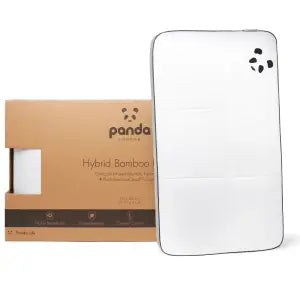 Hybrid Bamboo Pillow
Hybrid Bamboo Pillow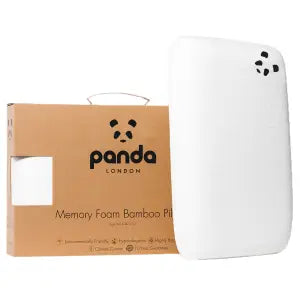 Memory Foam Bamboo Pillow
Memory Foam Bamboo Pillow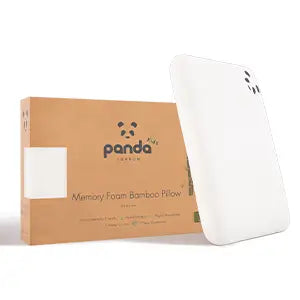 Kids Memory Foam Bamboo Pillow
Kids Memory Foam Bamboo Pillow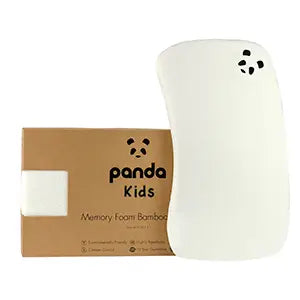 Baby Memory Foam Bamboo Pillow
Baby Memory Foam Bamboo Pillow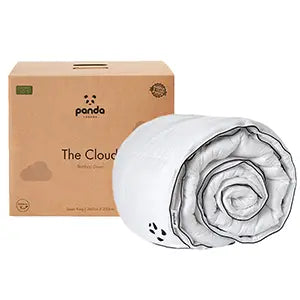 Panda Cloud Duvet
Panda Cloud Duvet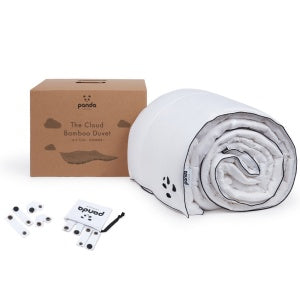 Bamboo Summer Duvet
Bamboo Summer Duvet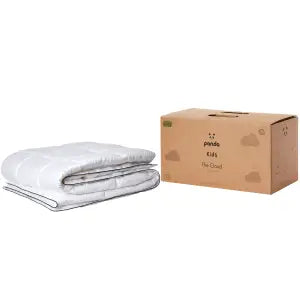 Kids Cloud Duvet
Kids Cloud Duvet
![[MemoryFoamPillow] Panda Luxury Memory Foam Bamboo product image](http://pandalondon.com/cdn/shop/products/Panda-Memory-Foam-Bamboo-Pillow-Panda-Life-scaled-e1623788835840.jpg?v=1750023574&width=800)
![[MemoryFoamPillow] Panda London Bamboo Memory Foam Pillow](http://pandalondon.com/cdn/shop/files/03_Memory_Foam_Bamboo_Pillow__alt01.jpg?v=1750023574&width=800)
![[MemoryFoamPillow] Panda London Bamboo Memory Foam Pillow girl hugging the pillow](http://pandalondon.com/cdn/shop/files/02_Memory_Foam_Bamboo_Pillow__alt02.jpg?v=1750023574&width=800)
![[MemoryFoamPillow] Panda London Bamboo Memory Foam Pillow on a Panda Topper](http://pandalondon.com/cdn/shop/files/Memory-Foam-Bamboo-Pillow-on-Bed-Topper-and-Adjustable-Straps-Shown-Lifestyle-Square-768x768_png.webp?v=1750023574&width=768)
![[MemoryFoamPillow] Panda London Bamboo Memory Foam Pillow Girl Holding Pillow Lifestyle](http://pandalondon.com/cdn/shop/files/01_Memory_Foam_Bamboo_Pillow__alt04.jpg?v=1750023574&width=800)
![[all] Bamboo Mattress Protector Package - PandaLondon](http://pandalondon.com/cdn/shop/files/Bamboo_Mattress_Protector_-_Packaging_Image_-_White_Background.webp?v=1721139172&width=1900)
![[all] Bamboo Mattress Protector for Hybrid Bamboo Mattress](http://pandalondon.com/cdn/shop/files/Bamboo_Mattress_Protector_New.webp?v=1721138562&width=1000)
![[all] Book on a Bamboo Mattress Protector](http://pandalondon.com/cdn/shop/products/Mattress-Protector-Listing-Images02.jpg?v=1721139189&width=1500)
![[all] Bamboo Mattress Protector Corner](http://pandalondon.com/cdn/shop/products/Mattress-Protector-Listing-Images03-e1623787734812.jpg?v=1721139189&width=1300)
![[all] Bamboo Mattress Protector Corner in line Panda London](http://pandalondon.com/cdn/shop/products/Mattress-Protector-Listing-Images04.jpg?v=1721139183&width=1500)
![[all] Panda Bamboo Mattress Protector Panda London](http://pandalondon.com/cdn/shop/files/Panda-Bamboo-Mattress-Protector-Guarantee-768x768_jpg_450393f5-91a9-499f-b15a-12d636a9a8b7.webp?v=1721139183&width=768)